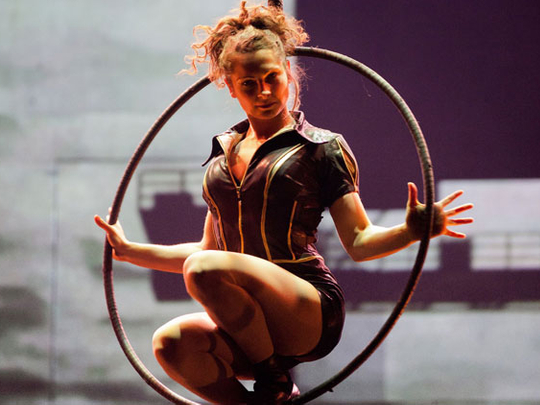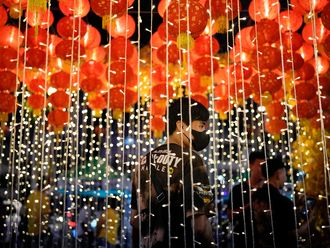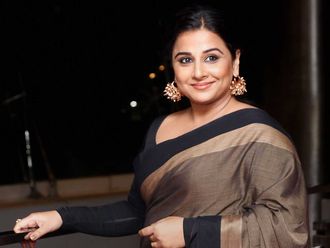
The reality of today’s circus — more streamlined aerial silks and trampolines, less garish lion tamers and cannonballs — is a relatively recent development, and much of it is thanks to the stupendously creative people of a minority group in a corner of Canada.
Part of that change was Jeannot Painchaud, the artistic director of Cirque Eloize, whose company celebrates 20 years this year with a 10-day residency at Dubai World Trade Centre from Thursday. (It’s pronounced el-waas) Having started with Canada’s famed Cirque du Soleil, he quit performing to start his own company, continuing the development of the “nouveau cirque” techniques we’re familiar with today.
“In 30 years, the circus has changed tremendously, and we were part of the beginning,” Painchaud says over the phone from Eloize’s homebase of Monteal. “It was about people who were interested in physical skills like acrobatics, but also people with no traditional circus background, working with a theatre director or choreographer from contemporary dance. The circus school was where we learned everything and today it is still really on the edge. When you go to the national circus school in Montreal you have to learn how to be an actor, dancer, and acrobat.”
Those disciplines will be showcased in Eloize’s show, iD, a mix of street dance and circus acrobatics. “I was interested in street dancing because there were some similarities between the street dance moves of the past 10-15 years with the movement of the new circus of 30 years ago. The mix of sensibility and physical power was something that I was interested in,” says Painchaud, but the idea of the show goes beyond the purely physical, he adds — it goes to the roots of the circus in French Canada, a region known for groundbreaking circus.
“We always fight for our identity,” he says. “We really work hard to express ourselves — we are a small community of 8 million French speaking people in a land of 300 million English speaking people. But at the same time, we are American, so we like the lightshow, sound, to party. We have, because of our French roots, sensibility, and also the sense of showbusiness ‘a la americaine’.”
iD, he says, “comes back to identity again. Questions about identity are always at the heart of our work. In street dancing, you have to fight for your individual identity, and you have to fight for your identity within your group. To work this way, in some sort of West Side Story-meets-hip hop-meets-circus, was something really challenging for our artists, and that’s why the adventure starts.”
Painchaud lifted the curtain on the magic of his circus company and the show debuting in Dubai this weekend.
What’s different about Cirque Eloize?
There’s no star in our show. There’s no best individual act. We always hire people who are the best in their discipline but always ready to participate in community work. That means out of the two-hours show, every single artist is a minimum of an hour on stage. Always the community, the clan, the family on the stage.
What can we expect from iD?
There are 16 artists in the show, plus a group of technicians. It’s highly acrobatic with a lot of group things, especially the ending, which is a trampo-wall act involving nearly all the company. We have the steel wheel, a six-foot wheel that was invented in our company, we have juggling, hand to hand, a lot of circus disciplines — but all integrate dancing.
What does Eloize mean?
It’s a word that means “heat lightning”. That’s how we describe ourselves. It’s been 20 years this year since we started the company with a group of friends. “Eloize” is an expression from a tiny group of islands in the Atlantic Ocean where we grew up. The goal from the very beginning was simply to create our own product and be independent and try to reinvent the circus.
A performer was killed recently during a Cirque Du Soleil show. How dangerous is the circus?
When you do such a high level, as it is in sports, there is always a certain amount of risk. But we calculate risk, we’re trained for that. In the case of Cirque du Soleil it was the first accident on stage in 35 years, so they are pretty much at the top of all the security matters. But accidents can happen.
There are thousands and thousands of people that do the circus today and these accidents are pretty rare. There was a period at the beginning of the 1950s-60s, where the security rules were not that same and there were more accidents. Today, especially through circus schools around the world, it’s very strict in terms of security. I will say it’s a safe job but accidents happen like in any other [job].
The circus has changed a lot. What will remain the same?
If you call yourself a circus, there has to be a certain sense of defying death, doing something extraordinary, to push your limits very high. Besides that, what is interesting is to tell stories, to bring people emotions and take the public on a journey where they question themselves, on top of being impressed by the acrobatics.
What’s next for the company?
We have another show that just launched, which is another show about identity but with a main character, called CirKopolis, that’s on the road. The main focus of the 20 year anniversary is that we are going to renovate our building here in Montreal. We are in an old train station which is a fantastic historical building. It was for the first train that went across Canada. This year we are going to put a lot of money into the building because we want to keep growing as an artistic group of people, not strictly in a circus but really not be shy to always challenge ourselves.
Do you perform anymore?
Not anymore, it’s been over 10 years since I stopped performing. I had a great life, I performed for 12 years, and now that I manage the company I think the young people are much better today than we used to be, so you’d better let the kids do their job. I made the choice over 10 years ago to become an entrepreneur and to keep developing the circus, because that was always my goal — to get the recognition as an art form.
What were you best at?
My discipline was acrobatic bicycle and juggling. I had such a great life as an artist touring and so on, but the adrenaline of doing the show – sometimes I miss that. But I have four kids now, so I have much more love from my kids than I would ever have from a public.












